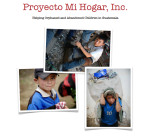
PROYECTO MI HOGAR PROGRAM EVALUATION
After an arduous research trip spanning one corner of the coast of Rabat, Morocco…to the interior Saharan desert lands of Merzouga, Morocco…this humanitarian researcher had her hands quite full of rich data. Her mission was to conduct field research examining the plight of abandoned and orphaned children of Morocco. After that trip, Dr. Caban-Vazquez received an enthusiastic and well-meaning call from a long lost friend. Her friend was eager to learn the details of the researcher’s most recent trip. Moreover, she wanted to share some OTHER compelling news about an organization that she learned about which was helping orphans and street children…but it was in Guatemala. Upon receiving the call, Dr. Caban-Vazquez halfheartedly sighed, took a deep breath, and she quietly asked God for strength to respond to her friend’s request.
Moments after receiving that predestined call; the humanitarian researcher learned about the grassroots organization Proyecto Mi Hogar, Inc. and the organization’s founder Joe Negrón. As she watched a YouTube video (forwarded during the call) the researcher was moved to tears and her heart was awakened by the urgent call to serve displaced orphans and street children in Guatemala. The rest as they say is history— Little did she know that she was on the brink of a blessed humanitarian quest to support this NGO that works tirelessly to serve these forgotten children.
Immediately upon viewing the Proyecto Mi Hogar’s promotional video, Ms. Garcia and the lead researcher were compelled to reach out to the director of this nonprofit organization to ask in what way they could be of service to this noteworthy cause. When they spoke with Mr. Negrón, they learned about the co-founders humble altruistic ways. They listened, as Mr. Negrón nobly and modestly shared how he was not solely responsible for Proyecto Mi Hogar’s impact. Joe declared that he did not do this humanitarian work alone. Alongside Joe Negrón, they discovered that there was a dynamic team of generous hearts and compassionate guardian angels that make his work possible in Guatemala. Upon learning about (a) this humanitarian’s quest; (b) the inception of Proyecto Mi Hogar’s mission; and (c) how this grassroots organization mobilized, rallied, and leaned on a core group of volunteers, sponsors, and a diverse body of supporters; Dr. Caban-Vazquez was extremely impressed and compelled to explore ways that she could make a lasting contribution for PMH. It personally reminded the research-practitioner of the program evaluation that she conducted for a grassroots organization serving an indigenous population of Kenyan Maasai child brides located in the remote Rift Valley. This program evaluation was commissioned by the advocacy humanitarian organization Equality Now, Inc. and conducted by the research organization Social Changers without Borders. As such, they dispatched the aforementioned researcher to conduct a program evaluation to take inventory of the progressive and innovative ways that a local organization worked to save child brides from the horrific practice of female genital mutilation. Ironically the researcher made the profound research connection that many of the effective and research-based strategies that Mr. Negrón spoke about actually aligned quite well with the research proven strategies that Dr. Caban-Vazquez witnessed and evaluated for the UN endorsed and sponsored Kenyan organization. Both NGO’s showed great promise and potential but more importantly they demonstrated evidence that they directly impacted the lives of vulnerable children. The fundamental bottom line was that both of these aforesaid NGOs helped to promote sustainable positive change that significantly impacted the lives of so many at risk and vulnerable children. The only difference between this notable organizations was that one was in Africa with sustainable streams of UN endorsed grants and sponsorship, and Proyecto Mi Hogar was on the field in Guatemala creating a wider range of impacting programs with extremely limited funding and regrettably without an large UN or international endorsed financial or technical support. Dr. Caban-Vazquez wondered if given a program evaluation measuring this new grassroots organization operational and program effectiveness, would the SWOT (Strengths, Weaknesses, Opportunities & Threats) matrix look similar? Does Proyecto Mi Hogar’s NGO leadership have great promise and potential for replicating their efforts to a larger frontier in Guatemala? What would be the largest impact that this organization can make to the current plight of Guatemalan street children and orphans? How could their effective and research proven organizational practices help to inform Guatemalan public policy that could ratify positive social change? How could Proyecto Mi Hogar’s efforts help inform empirical research on a global phenomena that unfortunately is endangering the lives of so many disadvantaged children around the world? The only way to fully examine and reach a conclusion on these aforementioned questions would be to investigate and conduct a formal review of the organization.
Upon making this personal connection, Dr. Caban-Vazquez was inspired to make a lasting contribution to Mr. Negrón and his team of change agents. She offered to conduct a pro-bono program evaluation of Proyecto Mi Hogar, with the goal that Mr. Negrón and his team could take inventory of their best practices, and examine a larger set of research-based intervention strategies that could better serve this at risk population of displaced street children and orphans in Guatemala.
Photo Credit: Joe Negron
For more information visit: www.proyectomihogar.com



So proud of PROYECTO MI HOGAR’s efforts to change the lives of orphans and street children in Guatemala. This organization really needs your help. Please do what you can to help them out and make a donation. It really WILL MAKE A DIFFERENCE. http://www.proyectomihogar.com